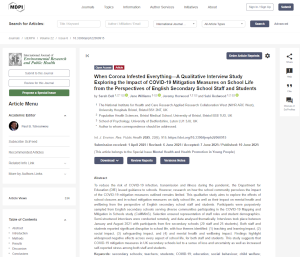Study reveals impact of COVID-19 safety measures on school life and mental health and wellbeing
18 June 2025
The widespread negative impact of COVID-19 safety measures on daily school life in English secondary schools has been revealed in a new study. Published in the International Journal of Environmental Research and Public Health, the NIHR ARC West led study examined the mental health and wellbeing of both staff and students during the pandemic.
Carried out as part of the COVID-19 Mapping and Mitigation in Schools (CoMMinS) study, researchers explored the experiences of the school community during the height of the pandemic. They conducted remote interviews between January and August 2021 with 20 secondary school staff and 25 students, from 5 diverse secondary schools across England.
This study showed that negative effects of the COVID-19 pandemic extended beyond school closures, with in-school safety measures – such as face coverings, physical distancing measures and testing procedures – disrupting teaching and learning. These measures had wide reaching negative impacts, including on mental health and wellbeing, the social fabric of the school community, safeguarding needs and welfare provision.
One student described the all-consuming presence of COVID-19 safety at school:
“For me it’s like every conversation you have it will somehow lead to Corona (virus), and everything is infested with the subject Corona, every lesson we speak about Corona, every lesson.”
Key findings
Teaching and learning impacts
- Staff struggled to adapt teaching practices and processes, and to support student learning and assessment
- Measures hindered the quality and consistency of education and student academic progress
Social impacts
- Loss of school rituals, transition events, routines and norms changed school culture and ethos and weakened the sense of community and belonging
- Loss of social opportunities, extra-curricular and enrichment events, and access to communal spaces, limited interactions and weakened social connections
- Measures increased social, emotional and behavioural needs of students
Safeguarding and welfare impacts
- Staff struggled identifying safeguarding risks and protecting vulnerable students
- Loss of access to external services and professionals often led to delayed intervention, and staff struggled to provide usual pastoral care
- Measures led to increased safeguarding concerns and student welfare needs
Mental health and wellbeing impacts
- Measures increased staff workload
- Staff and students described a pervasive sense of loss, disconnection and struggles coping with change and uncertainty
- Staff and students described increased stress, frustration, anxiety and emotional exhaustion
- Staff and student lacked support for their mental health and wellbeing
Lessons for future pandemic policies
This study highlights the importance of minimising disruption to school life in future pandemic responses. The findings show the necessity of maintaining school routines and interactions.
Dr Sarah Bell, University of Bristol and NIHR ARC West and lead author of the study, said:
“The study sheds light on the real-world consequences of COVID-19 pandemic policies in education. Future pandemic planning must balance infection control with the educational, social, welfare and emotional needs of the school community.”
Professor Jeremy Horwood, University of Bristol and NIHR ARC West, said:
“Supporting mental health of staff and students and addressing the disproportionate impact on vulnerable students is key in any future crises. Continued access to specialist services and enhanced in-school capacity for safeguarding and pastoral care must be prioritised.”
The researchers warned that future safety measures should be grounded in evidence and implemented with careful planning. The COVID-19 pandemic made it clear that schools are more than just places of learning: they are essential social support systems. Future policies should recognise and protect this broader role.
Paper
